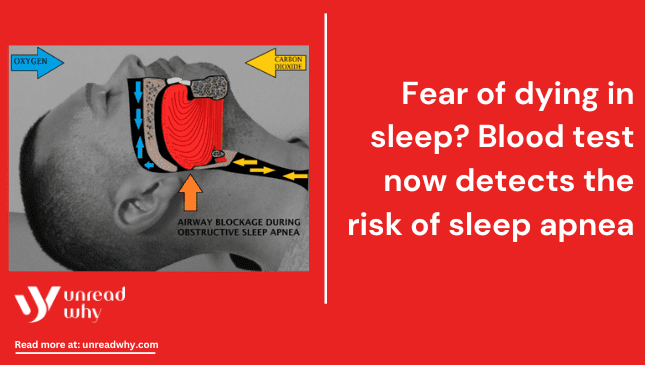Did you know that snoring can be more than just a nighttime nuisance? Yes, you heard it right. 936 million adults are estimated to be suffering from mild to severe OSA, and 94% of them have the symptoms of snoring. Surprisingly, this can lead to severe death while sleeping.
What is behind the fear of dying in sleep?
Obstructive sleep apnea, also known as OSA is known as a crucial factor where the airway either completely or partially collapses leading to a reduction in the oxygen level during sleep. Sometimes people who are suffering from the problem of loud and disruptive snoring can be attacked by sleep apnea. This can impact mental well-being, and cardiovascular health, and ultimately can cause death.
Doctor’s suggestion for blood test
This life-threatening illness can be predicted by a normal blood test, as the Doctor says. Monical Levy Andersen, a professor of UNIFESP, says that there might be a potential link between sleep apnea and high levels of homocysteine, an amino acid. In her opinion, this two-way relationship can be predicted through normal blood tests. She added, “It would be a good idea for more physicians in all specialties to include a homocysteine test in the blood work prescribed for checkups of people over 40. It’s simple and low-cost for the SUS [Sistema Único de Saúde, Brazil’s public health service]. The results could provide more information on this correlation, at the very least.”
Research conducted by the European Archives of Oto-Rhino-Laryngology with 854 volunteers. All of them are 20 to 80 years old. In 2007 they all underwent a polysomnography test to measure the apnea-hypopnea index, in which their breathing was counted during their sleep of how many times the breathing slowed or stopped. Among 854 volunteers, 8.8% were diagnosed with severe sleep apnea problems, and they have more than 15 µmol/l in their blood, which is considered high. 10 µmol/l is normal and seen in half of the volunteers, and 10 to 15 µmol/l is moderate, which is seen in 24.4 percent of volunteers.
Now, it might be a question in your mind: if it is that level of danger, what are the main symptoms by considering we can undergo this blood test? Well, the first symptom, as we discussed above, is the normal habit of loud snoring. But there are many other symptoms that you should be aware of –
Symptoms of sleep apnea
- Mood swings
- Daytime sleepiness
- Unusual breathing pattern
- Feeling exhausted
- Morning Headaches
- Heartburn
- Gasping or choking
- Difficulty in concentration
- Frequent nocturnal urination
- Restless sleep
- Interrupted sleep or Insomnia
Risk factors of sleep apnea
If sleep apnea is left untreated then it might cause several risk factors. Among those risk factors, the common factors are smoking, being overweight, nasal congestion, high blood pressure, stroke, hormonal disorders, stroke and many more.
Different ways of fixing sleep apnea
If sleep apnea is diagnosed through a blood test, then it is necessary to take medical suggestions like a surgical implant, therapy for mouth and facial muscles, surgical procedures, and the like. However, besides that people need to lead a healthy and stress-free lifestyle to avoid the chance of sleep apnea. Regular physical activity, a healthy weight, a healthy diet, limiting caffeine and alcohol intake, and quitting smoking can prevent the severe health issue of sleep apnea.
FAQ
Do we have concerns about fear of dying in sleep?
If you have the habit of loud snoring during sleep, you might have the chance of diagnosing Obstructive sleep apnea (OSA).
How do you fix sleep apnea?
If sleep apnea is diagnosed through a blood test, then it is necessary to take medical suggestions like a surgical implant, therapy for mouth and facial muscles, surgical procedures, and the like.
How to prevent sleep apnea?
Regular physical activity, a healthy weight, a healthy diet, limiting caffeine and alcohol intake, and quitting smoking can prevent the severe health issue of sleep apnea.
Can snoring lead to death?
It is a symptom of sleep apnea. 936 million adults are estimated to be suffering from mild to severe OSA, and 94% of them have the symptoms of snoring, which can lead to death.
What are the signs or symptoms of sleep apnea?
- Mood swings
- Daytime sleepiness
- Unusual breathing pattern
- Feeling exhausted
- Morning Headaches
- Heartburn
- Gasping or choking
Can a blood test detect sleep apnea?
Monical Levy Andersen, a professor of UNIFESP says that there might be a potential link between sleep apnea and high levels of homocysteine, an amino acid. In her opinion, this two-way relationship can be predicted through normal blood tests.


